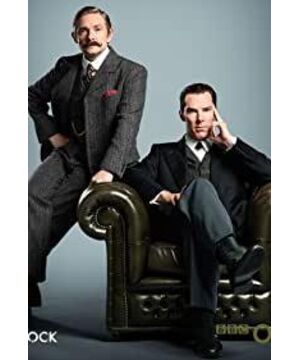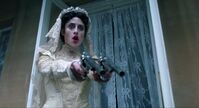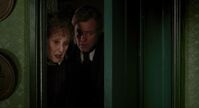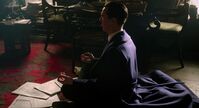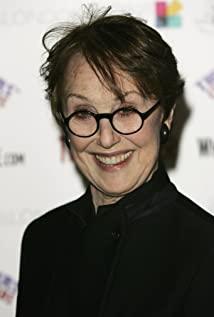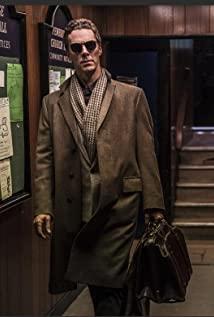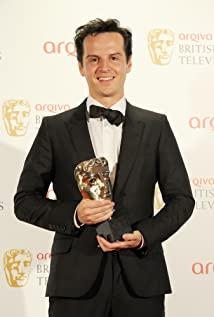What is a fan movie? Even as a fan, even if you only hang the posters of Cun Fu and Martin on the screen for 90 minutes, you will lick the screen and give it five stars.
Blessed, then, are those who like Cumford and Martin, for they shall be comforted.
As a sequelae of the TV series, most of the shots in the movie are close-ups, and the long face of Cuan Fu is almost = to break the limit of the screen aspect ratio, buy the audience in the first few rows, and may even be spit out when he speaks excitedly. splash.
You can also enjoy watching the drama floating on the facial close-ups, the actors are of course excellent. However, in such a production, the big scenes are basically underserved, and the special effects are 75 cents. In terms of movie standards, it is indeed a little shabby.
Besides, I'm still watching the giant screen.
Strictly speaking, this is just a TV show on the big screen.
Although as an episode, it has enough heart.
Used to seeing the modern version of Sherlock, he suddenly returned to the Victorian era, but instead re-inspired freshness, everyone almost forgot that this was the era in which Conan Doyle's original work was written.
"Opening Titles" sounded, everything was the rhythm and pattern familiar to fans of the show, all the characters returned, and even the scene where Watson and Sherlock met, except for the changing time and space scenes, was almost exactly the same as the beginning of the episode.
This is actually another clue buried in the movie. You think it is a tactful tribute to yourself, but it is just a coincidence of the collision of time and space.
If you want to say different, in addition to the special texture of the Victorian era, the film version also adds a touch of horror and cold Gothic atmosphere.
The dead bride disappeared into the fog of London after killing her.
In the cold labyrinth, the dead sang songs.
This kind of feeling is rare in the brightly-colored episodes, but it is reminiscent of Tim Burton's "Sleepy Hollow."
Speaking of the story, you don't have to worry about the role interpretation. After all, there are already three seasons of drama.
However, the actors entered too quickly, and the film did not spend too much time on the relationship between the characters, but instead tested the brains of non-drama fans.
When it comes to Sherlock Holmes, of course, the mystery case is inseparable.
Well, this abominable bride, as always, has no reasoning or tricks to speak of.
The suspense is big enough, the atmosphere is done enough, a little scary, but that's about it.
The movie overturns countless impossibilities, and seems to have made some large-scale hints deliberately, but it has nothing to do with deductive reasoning.
The lack of various clues makes it difficult for the audience to follow the plot to think together, and can only wait for the genius to reveal the answer.
The detective seemed to have insight into the truth early in the morning, but he was just going around and talking and playing games with the audience.
When the truth finally came out, there was no such sudden realization.
Instead, it feels like reading a third-rate reasoning in "Story Club" or "Legend of the Ancients".
In contrast, only in terms of reasoning, Comrade Chen Sicheng in the same period has done much better. (My God, how much do I have to charge Chen Sicheng?)
Just like the previous episodes uselessly involved terrorism, this time the film has to be accompanied by some overly grand political propositions. This is of course unexpected, it is both praise and derogation, a brutal crime to achieve a great change, there is no lack of irony in reality, but also in line with the usual British sense of humor.
Instead, the film does something interesting in its structure. Originally thought that except for the characters and characters copied from the series, the story was completely transplanted to the 19th century.
However, the film suddenly intersects with the modern part after advancing the bridal case at length.
The two eras interspersed with each other and confirmed each other. They pushed through the fog again and again to explore the truth, not only to track down the murderer, but also to analyze the knot.
The bride who died in the nineteenth century corresponds to Moriarty, who committed suicide by suicide in the twentieth century, and Moriarty once again, as Sherlock Holmes' evil doppelganger, starts an inner war with him.
This is not a simple thinking labyrinth constructed by modern Sherlock Holmes. I prefer to understand two different eras as parallel universes. They are connected and influence each other, so the modern Sherlock can enter the past to find clues, and the former Sherlock also You can chat about the future by the fireside. As a result, some pseudo-sum elements will appear suddenly. For example, the Victorian era mentioned data and hard disks, and Watson's face in the carriage suddenly lost his beard and suddenly appeared again.
The travel part of the movie is reminiscent of "Inception". In the layers of fantasy, it seems that it is no longer important who the murderer is. The key is to defeat the demon.
Yes, in the end, the bride's conspiracy doesn't seem so scary, and the big bad Moriarty is not resurrected after all. The one who saves the world is still full of love. If there is no good friend to help, how can our detective drive Moriarty back to the abyss again? The story is told like this, also to take care of the fans' tastes. Lovers will eventually become married. No matter how clever and brave Mary is, and even if Andrew who plays Moriarty has been exaggerated so much in order to express his madness, he still can't get the CP's in the end. A trace of pity.
Fortunately, the story has finally returned to the main line of the series. After all, Christmas is only one day a year. Open the gifts and be happy. As for what kind of enemies and stories will there be in S4, that has nothing to do with the movie. things are up.
PS: The two tidbits before and after the movie version are really too watery to have friends.
View more about The Abominable Bride reviews


